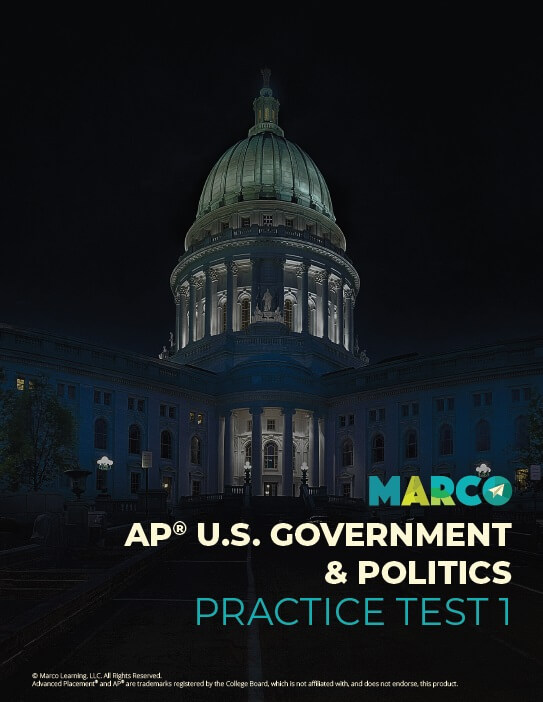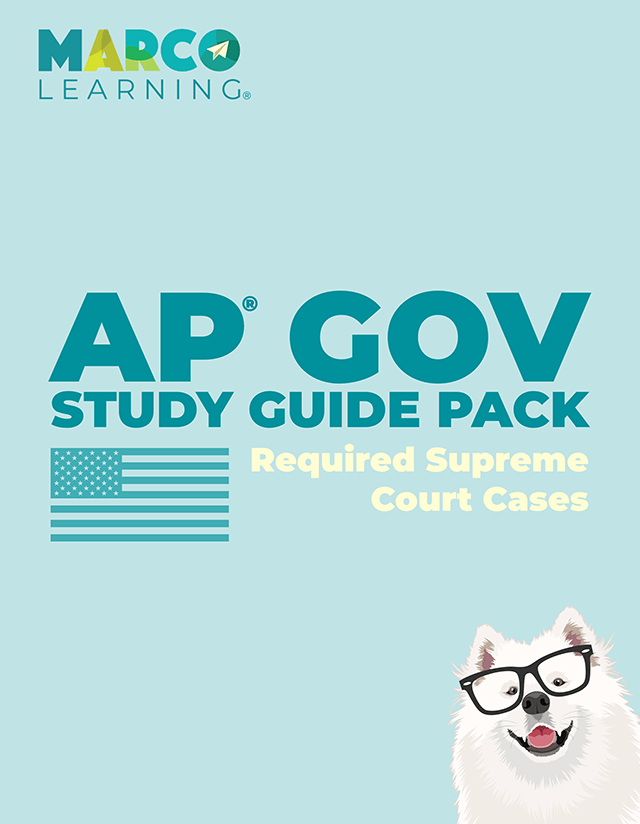


To score well on your AP® U.S. Government and Politics Exam, it is important to become familiar with all of the required Supreme Court cases. In the free-response section of your AP U.S. Government Exam, you will have to answer four essay questions. The third of these questions is a SCOTUS comparison essay, in which you will be required to compare a non-required Supreme Court case with a required Supreme Court case, so get to know each required Supreme Court case as well as possible!
The required Supreme Court cases for the AP U.S. Government and Politics Exam in 2021 are:
Marbury v. Madison (1803)
McCulloch v. Maryland (1819)
Schenck v. the United States (1919)
Brown v. Board of Education (1954)
Engel v. Vitale (1962)
Baker v. Carr (1962)
Gideon v. Wainwright (1963)
Tinker v. Des Moines Independent Community School District (1969)
New York Times Co. v. United States (1971)
Wisconsin v. Yoder (1972)
Roe v. Wade (1973)
Shaw v. Reno (1993)
United States v. Lopez (1995)
McDonald v. Chicago (2010)
Citizens United v. Federal Election Commission (2010)
PRECEDENT
District of Columbia v. Heller (2008)–a landmark 5-4 decision that the Second Amendment does, in fact, protect an individual’s right to bear arms. The Court declared the District of Columbia’s ban on handguns unconstitutional.
FACTS OF THE CASE
In 2010, a retired resident of Chicago named Otis McDonald attempted to legally purchase a handgun for personal home defense. According to McDonald, his neighborhood had gradually become unsafe due to an influx of gang activity and the increased presence of drug dealers. While he legally owned shotguns and was an experienced hunter, he felt that a handgun would provide better protection for his home after a combined five break-in attempts on his house and garage. He was unable to legally purchase a handgun due to a city-wide handgun ban that was enacted in 1982. He joined with three other Chicago residents to sue the city of Chicago for limiting their rights to keep and bear arms under the Second Amendment. After progressing through lower courts, the suit was heard by the Supreme Court in 2010.
THE DECISION
In a 5-4 decision, the Court ruled states could not impede their citizens’ rights to keep and bear arms under the Second Amendment. The ruling was ultimately based on the Court’s understanding of the Fourteenth Amendment, which argues that states do not have the right to deprive citizens within their borders rights or privileges that are accorded to them under the Constitution. The Court ruled that since the Fourteenth Amendment ensured that the entirety of the Constitution applied to a state’s inhabitants, Chicago could not restrict its citizens’ rights to keep and bear arms by denying them the right to legally purchase a handgun for “lawful purposes.”
IMPACT
The ruling in McDonald v. Chicago was claimed as a victory by both pro-gun and anti-gun advocates. Both sides were able to claim victory because the decision was narrowly tailored as to whether the Fourteenth Amendment caused the Second Amendment to pass to the states. Pro-gun advocacy groups felt that the decision set a precedent for overturning state laws restricting handgun ownership. Anti-gun advocacy groups were also able to claim victory because they argued that the narrow margin of victory, and strong dissent from some of the Supreme Court judges that argued that there’s no “private right of armed self-defense,” set the stage for future court battles that could restrict private gun ownership. New cases will undoubtedly open the question of how much, if any, states can restrict the keeping and bearing of arms within their jurisdiction.
SUBSEQUENT CASE
Caetano v. Massachusetts (2016)–ruled that bearable arms that were not in use at the time of the drafting of the Second Amendment, such as stun guns, were still covered under the Second Amendment. This case broadened the types of weapons that could be considered lawful under the Second Amendment to weapons that were not historical and did not have a military purpose.
KEY TERMS
Selective Incorporation Under the Fourteenth Amendment, states cannot deny their citizens life, liberty, or property without the due process of the law. The Supreme Court has consistently used the policy of “selective incorporation” to argue that the Fourteenth Amendment means that most, if not all, of the Bill of Rights applies at the state level.
Militias Throughout the early history of the American colonies and through the Revolutionary War, military force was often provided by local groups, called militias, that consisted of local volunteers who served brief stints in the military. The text of the Second Amendment references the right to bear arms in the context of militias. This has led to a debate about whether the Second Amendment protects an individual right to bear arms or only the right in the
The best way to get better at something is by practicing.
That’s why it’s so important that you take practice tests to help you get better at the AP U.S. Government and Politics Exam. Only then can you expect to get a good score—and even improve your score.
 Help
Help